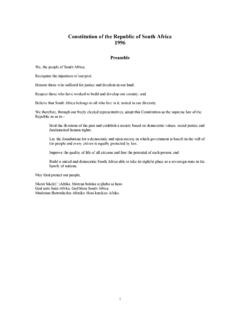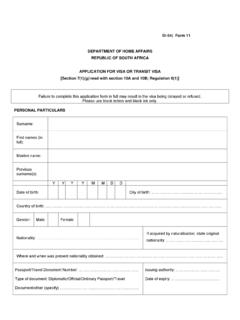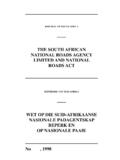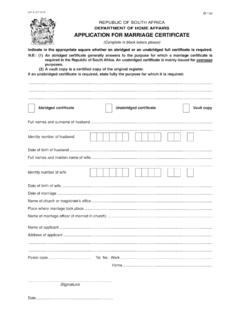Transcription of CONSTITUTIONAL COURT OF SOUTH AFRICA Case …
1 CONSTITUTIONAL COURT OF SOUTH AFRICACase CCT 12/99EX PARTE THE PRESIDENT OF THE republic OF SOUTH AFRICAIN RE: CONSTITUTIONALITY OF THE liquor BILLH eard on:31 August 1999 Decided on:11 November 1999 JUDGMENTCAMERON AJ:Introduction [1]The legislation before us is inchoate. Parliament has passed a bill , but it has notreceived the assent of the President, who referred it to this COURT for a decision on itsconstitutionality. This is the first time that the provisions of the 1996 Constitution ( theConstitution ) allowing for such a referral have been invoked, and our decision requiresconsideration of what that procedure entails as well as of the questions raised concerningthe bill s constitutionality.
2 [2]The liquor bill was introduced in the National Assembly on 31 August 1998. Itpassed through various legislative stages in terms of section 76(1) of the Constitutionbefore Parliament approved it on 2 November 1998. When the bill was sent to thePresident for his assent, he declined to grant it. Instead, because he had reservationsabout its constitutionality, he referred it back to the National Assembly on 22 JanuaryCAMERON AJ1 Section 84 of the Constitution of the republic of SOUTH AFRICA , Act 108 of 1996, sets out the powers andfunctions of the President.
3 It provides in part: (1) The President has the powers entrusted by the Constitution and legislation, including those necessaryto perform the functions of Head of State and head of the national executive.(2) The President is responsible for (a)assenting to and signing Bills;(b)referring a bill back to the National Assembly for reconsideration of the bill s constitutionality;(c)referring a bill to the CONSTITUTIONAL COURT for a decision on the bill s constitutionality;(d) - (k) .2 Section 44(2) provides: Parliament may intervene, by passing legislation in accordance with section 76 (1), with regard to amatter falling within a functional area listed in Schedule 5, when it is necessary (a) to maintain national security;(b) to maintain economic unity;(c) to maintain essential national standards; (d) to establish minimum standards required for the rendering of services.
4 Or(e) to prevent unreasonable action taken by a province which is prejudicial to the interests of anotherprovince or to the country as a whole. 21999 for reconsideration. On 3 March 1999, the National Assembly resolved that theHouse, having reconsidered the liquor bill [B 131B-98], returns it to the President . Noamendments had been effected. On 8 March 1999, the President referred it to this Courtfor a decision on its constitutionality. In doing so, he invoked his power pursuant tosection 84(2)(c) of the Constitution, which provides that the President is responsible for referring a bill to the CONSTITUTIONAL COURT for a decision on the bill s constitutionality.
5 1[3]On 19 March 1999 the President of this COURT issued directions, attaching thePresident s notice of referral, and inviting the President himself and the government ofthe republic of SOUTH AFRICA , any political party represented in the National Assembly,any provincial delegation represented in the National Council of Provinces and anyprovincial government to make representations to the COURT concerning theconstitutionality of the bill , and requiring any party wishing to do so to give notice of itsintention, and to indicate whether it wished to lead evidence and if so the purpose andrelevance of that evidence.
6 [4]In response, the Western Cape government indicated that it wished to berepresented and to place before the COURT affidavit evidence of the regulation of liquorand liquor licensing in the Western Cape, in SOUTH AFRICA and in comparable jurisdictions, showing that it is not necessary to have national legislation on liquor licences for any ofthe purposes set out in section 44(2) .2 The Minister of Trade and Industry wished tosupply evidence of the background to and history of the legislation and why it wasnecessary for Parliament to legislate on these matters in the light of the requirements ofsection 44(2).
7 CAMERON AJ3In terms of section 2 of the Constitution, the Constitution is the supreme law of the republic and lawor conduct inconsistent with it is invalid .4 Section 38 defines standing under the bill of Rights (Chapter 2) to seek relief; section 172 defines thepowers of courts in CONSTITUTIONAL 80 reads: 80. Application by members of National Assembly to CONSTITUTIONAL COURT . (1)Members of the National Assembly may apply to the CONSTITUTIONAL COURT for an orderdeclaring that all or part of an Act of Parliament is unconstitutional.
8 (2) An application (a) must be supported by at least one third of the members of the National Assembly;and(b) must be made within 30 days of the date on which the President assented to andsigned the Act.(3) The CONSTITUTIONAL COURT may order that all or part of an Act that is the subject ofan application in terms of subsection (1) has no force until the COURT has decided theapplication if (a) the interests of justice require this; and(b) the application has a reasonable prospect of success.(4) If an application is unsuccessful, and did not have a reasonable prospect of success,the CONSTITUTIONAL COURT may order the applicants to pay statutes may be challenged under the comparable provisions of section provisions in section 121 permit provincial Premiers to refer provincial Bills to theConstitutional COURT for decisions on their constitutionality.
9 3[5]Under further directions issued by the President of this COURT , the Western Capegovernment lodged an affidavit dealing with its objection to the bill . Thereafter, theMinister of Trade and Industry, as representative of the government of the republic ofSouth AFRICA ( the Minister ), submitted an affidavit, in response to which thegovernment of the Western Cape submitted a replying affidavit. Both the Western Capegovernment and the Minister were represented at the Referral Under Section 79[6]Our decision requires us to consider first what the referral to this COURT by thePresident for a decision on a bill s constitutionality entails.
10 The Constitution, whichsubjects all legislation to review for its constitutionality, and makes any law inconsistentwith it invalid,3 embodies three routes to judicial consideration of the constitutionality oflegislation passed by Parliament. One is a challenge by an interested party in a competentCourt under one or more provisions of the Another is an application by atleast one third of the members of the National Assembly to the CONSTITUTIONAL COURT foran order declaring all or part of an Act of Parliament The third is thatinvoked in the present case, namely referral by the President before a bill becomes [7]

















